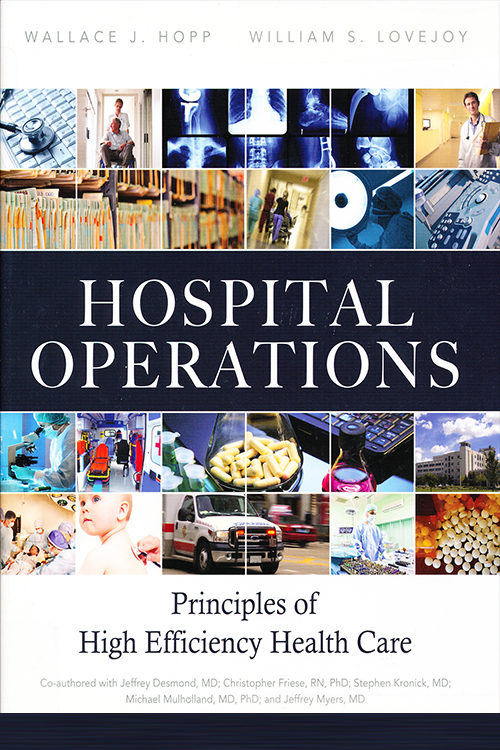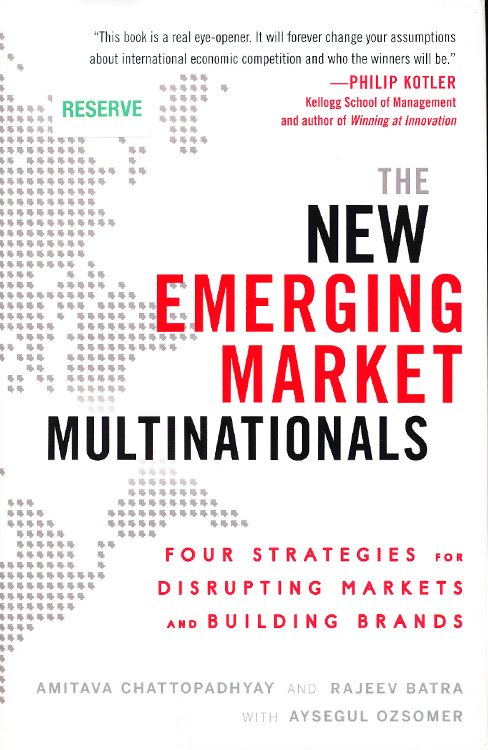
By one estimate, the U.S. wastes $480 billion annually on healthcare expenditures that don’t improve care. Worse, because of faulty systems – not personnel – up to 98,000 people die every year due to preventable medical errors – and that doesn’t count non-terminal events such as hospital-acquired infections. In Hospital Operations, two leading operations management experts and four senior physicians demonstrate how to apply new OM advances to substantially improve any hospital’s operational, clinical, and financial performance.
Replete with examples, this book shows how to diagram hospital flows, trace interconnections, and optimize flows for better performance. Readers will find specific guidance on improving emergency departments, operating rooms, hospital floors, and diagnostic units; and successfully applying metrics. Coverage includes: reducing ER overcrowding and enhancing patient safety…improving OR scheduling, enhancing organizational learning, and responding to surgeons and other stakeholders… improving bed availability, optimizing nurse schedules, and creating more seamless patient handoffs… reducing lab turnaround time, improving imaging responsiveness, and decreasing lab errors…successfully applying the right metrics for every facet of hospital performance. The authors conclude by previewing the "Hospital of the Future," addressing issues ranging from prevention and self-care to the evolution of technology and evidence-based medicine.

Positive Organizational Scholarship (POS) is an umbrella concept used to emphasize what elevates and what is inspiring to individuals and organizations by defining and improving on the challenging, broken, and needlessly difficult. POS focuses attention on the generative dynamics in organizations that lead to the development of human strength, foster resiliency in employees, enable healing and restoration, and cultivate extraordinary individual and organizational performance. It is most interested in the motivations and effects associated with remarkably positive phenomena--how they are facilitated, why they work, how they can be identified, and how organizations can capitalize on them.
This handbook is the first major resource for scholars and professionals interested in learning about POS. It is an ideal resource for organizational scholars, students, practitioners, human resource managers, and professional associations, with coverage of the full spectrum of organizational theories and outcomes that define, explain, and predict the occurrence, causes, and consequences of positivity.

In this report, KPMG International's network of firms analyzes a system of 10 sustainability megaforces that will impact each and every business over the next 20 years. These forces do not act alone in predictable ways. They are interconnected. They interact. It is important for business leaders to understand this system of forces; assess the implications for their own organizations; and devise strategies for managing the risks and harnessing the opportunities. We can never know the future. But it is good business sense to be prepared for the possibilities: to expect the unexpected.

From smartphones and computers to blue jeans and beer, companies from China, India, Taiwan, Mexico, Turkey, and other emerging markets are now winning leading market shares with their own-branded, high-quality products—rather than with poorly produced products sold under others' brand names. These emerging-market multinational companies (EMNCs) are giving the incumbent market leaders of North America, Western Europe, and Japan a run for their money in the areas of innovation, branding, and marketing.
How have these small, under-resourced businesses come so far so quickly? And what can you learn from their strategies and tactics?
Renowned experts in global branding and marketing, the authors of The New Emerging-Market Multinationals conducted an in-depth study of 39 EMNCs to reveal the innovative compete-from-below strategies and tactics fueling these companies' meteoric rise.
This text's engaging and practical, yet research-based style is designed to help readers achieve the success they desire. Specifically, the ideas, tools, and techniques help readers enhance their effectiveness (ability to achieve results), career potential (e.g., marketability, salaries, promotions, job satisfaction and job choice), and general well-being (e.g., happiness, health, work-life "balance").

This book summarizes the research findings in crisis management and generate new possible avenues for theoretical and practical examination. The topic of “organizational crises” and crisis management has become more important today as investigations of the damage control aspect of crisis management recognize the importance of the leadership skills which are necessary to lead an organization through crisis.
This book provides a baseline understanding of the field of crisis management; presents a new perspective on what leaders of organizations need to do in advance of, and during a crisis; illustrates the process and consequences of effective and poor crisis handling based on a decade of research; and provides ideas to energize a research agenda on crisis management as firms become increasingly and globally competitive.
Dr. Aradhna Krishna is the Dwight F. Benton Professor of Marketing at the Ross School of Business, University of Michigan, and is one of the pioneers of the field of sensory marketing. She has conducted research on how consumer perceptions and responses change as a function of the type of pricing, promotion, packaging and branding efforts undertaken by managers. Her research has examined many forms of sensory perception - visual, haptic, olfactory, taste and combinations. She also organized the first conference on sensory marketing in 2008, bringing together leading psychologists, neurologists, marketing academics and practitioners. Her work has been cited on NPR, New York Times, Wall Street Journal, and other publications.
In helping establish a new field of study in the organizational sciences, POS, this book examines a variety of positive dynamics in businesses and organizations that give rise to extraordinary outcomes. Positive Organizational Scholarship does not adopt one particular theory or framework, but encompasses any phenomenon that leads to positive, nurturing results. This collection of essays, written by established senior scholars, explains why and how these commonsense prescriptions work.




